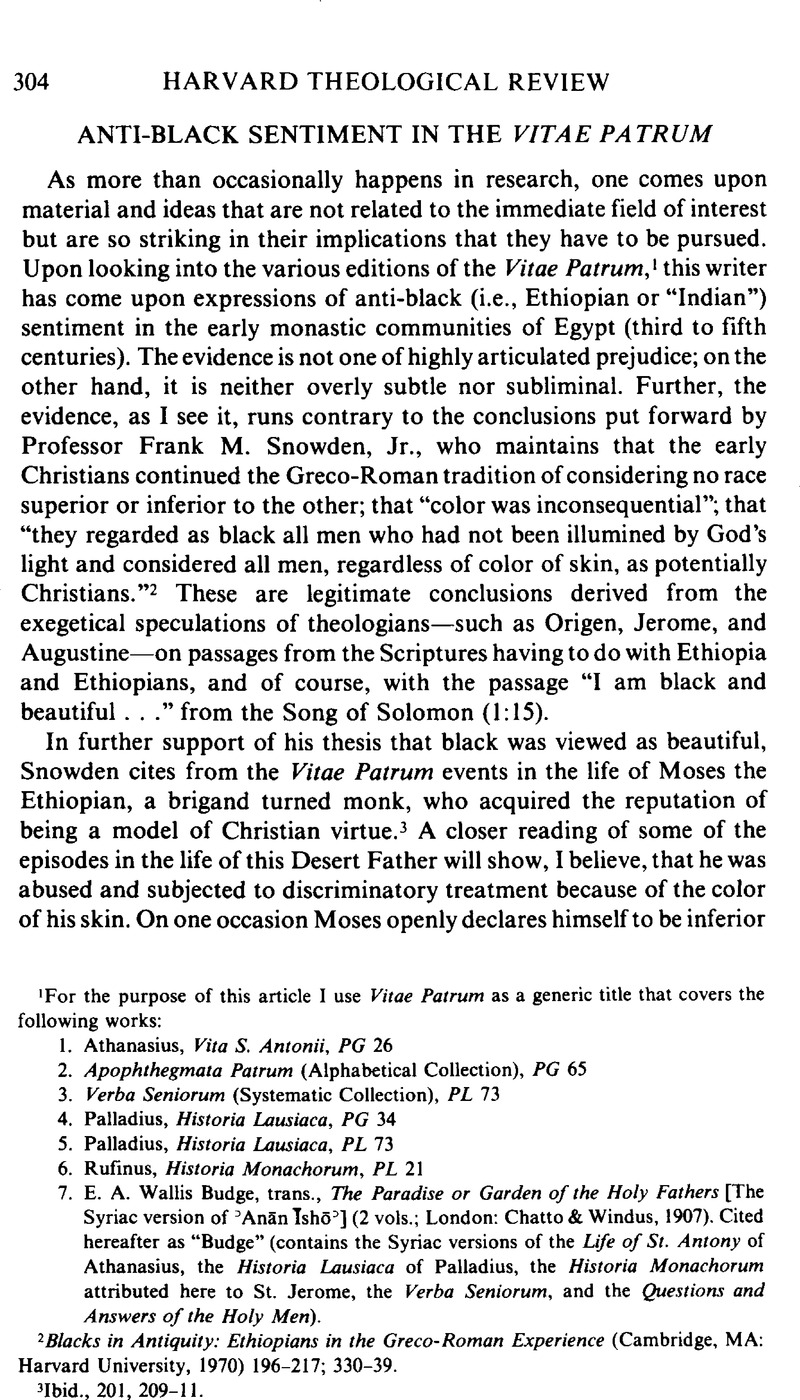Article contents
Anti-Black Sentiment in the Vitae Patrum
Published online by Cambridge University Press: 10 June 2011
Abstract

- Type
- Notes and Observations
- Information
- Copyright
- Copyright © President and Fellows of Harvard College 1978
References
1 For the purpose of this article I use Vitae Patrum as a generic title that covers the following works:
1. Athanasius, Vita S. Antonii, PG 26
2. Apophthegmata Patrum (Alphabetical Collection), PG 65
3. Verba Seniorum (Systematic Collection), PL 73
4. Palladius, Historia Lausiaca, PG 34
5. Palladius, Historia Lausiaca, PL 73
6. Rufinus, Historia Monachorum, PL 21
7. Budge, E. A. Wallis, trans., The Paradise or Garden of the Holy Fathers [The Syriac version of ՚Anān Ishō՚] (2 vols.; London: Chatto & Windus, 1907)Google Scholar. Cited hereafter as “Budge” (contains the Syriac versions of the Life of St. Antony of Athanasius, the Historia Lausiaca of Palladius, the Historia Monachorum attributed here to St. Jerome, the Verba Seniorum, and the Questions and Answers of the Holy Men).
2 Blacks in Antiquity: Ethiopians in the Greco-Roman Experience (Cambridge, MA: Harvard University, 1970) 196–217; 330–39Google Scholar.
3 Ibid., 201, 209–11.
4 See below (p. 128). Cf. Waddell, Helen, The Desert Fathers (Ann Arbor, MI: University of Michigan, 1957) 59CrossRefGoogle Scholar: Moses, “the long black man…liable to gibes about his colour.”
5 Budge, 2. 14.
6 PG 65, col. 284; PL 73, cols. 970–71.
7 Budge, 2. 325–26.
8 Ibid., 2. 112. For the Latin version see PL 73, cols. 959–60.
9 PG 65, col. 284; PL 73, col. 959. The Syriac version and some readings in the Greek MSS have “Bishop” instead of “Archbishop.” Snowden (p. 210) cites him incorrectly as the “archbishop of Alexandria.”
10 There appears to be some confusion in the translation of Abba Moses's oblique retort (ˇAρα τὰ ἔξω, κῦρι ó Πάπας, ἤ καὶ τὰ ἔσω). The Greek text, PG 65, col. 284, makes the remark exclamatory when it is clearly interrogatory. Cotelier's translation of the Greek is also misleading (Utique exterius, domne papa, utinam el interius). Snowden (p. 201) in his translation apparently follows the Latin of Cotelier: “Outwardly, holy Father, would that I were inwardly too.” The Latin version of Pelagius in the Verba Seniorum (PL 73, col. 959 ) is closer to the Greek: “Putas a foris, domne papa, aut deintusT' A recent translation of the Greek text by Benedicta Ward (The Sayings of the Desert Fathers [London: Mowbrays, 1975] 117Google Scholar) gives a completely different meaning to the remark: “It is true of the outside, lord and father, but what about Him who sees the inside?” I find nothing in the Greek or Latin text to support this translation.
11 PG 26, cols. 849–52; Budge, 1. 10–11. The Syriac version has the devil assuming the appearance of an “Indian boy” but is later described as a “black being.” I have translated καὶ γὰρ μέλας εἶ τòν νoῦν “for you are black-hearted.” A more colloquial translation might be “for you have a dirty mind.” Budge's translation of the Syriac has “for thou art black in thy nature.”
12 PL 73, col. 879; Budge, 2. 131.
13 Budge, 2. 130.
14 PL 73, cols. 874–75.
15 PG 65, col. 185; Budge, 2. 54–55.
16 PG 34, col. 1137; PL 73, col. 1155. Budge (1. 34(M1) has the monk pray to have his “pride” taken away, and has the demon cry out that he is the “spirit of pride.” The Greek text has ἀλαζoνία which I have translated as “false pretensions”; and I have also translated ὑπερηϕανία as “arrogance.”
17 PL. 21, cols. 453–55; a short redaction of this account is found in PL 73, cols. 765–66. In the latter, nigros is found instead of tetros (“loathsome”). This narrative is lacking in both the Greek and Syriac redactions.
18 Halkin, F., ed., “Saint Antoine le Jeune et Pétronas le vainquer des Arabes en 863,” AnBoll 62 (1944) 215–17Google Scholar.
- 5
- Cited by




